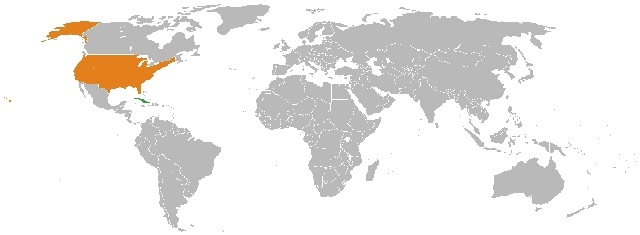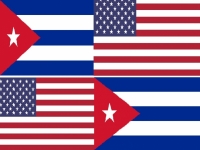Miscellaneous
JOINT STATEMENT BETWEEN CUBA & U.S.A. ON COOPERATION ON ENVIRONMENTAL PROTECTION
TERRESTRIAL ENVIRONMENT OF BOTH STATES

USA in Orange & CUBA in Green
The Republic of Cuba and the United States of America,
Recognizing the importance of protecting the terrestrial environment of both States, as well as the coastal and marine environments of the Caribbean Sea, Gulf of Mexico, and other waters in the region :
Affirming their intention to strengthen cooperation on disaster risk reduction and address the causes and effects of climate change, extreme weather events and ocean acidification, including through strategies to improve resilience to climate change and oil spills and to natural disasters, particularly hurricanes;
Recognizing the importance of protecting the terrestrial environment of both States, as well as the coastal and marine environments of the Caribbean Sea, Gulf of Mexico, and other waters in the region :
Affirming their intention to strengthen cooperation on disaster risk reduction and address the causes and effects of climate change, extreme weather events and ocean acidification, including through strategies to improve resilience to climate change and oil spills and to natural disasters, particularly hurricanes;
Acknowledging a range of ongoing cooperative activities related to environmental protection involving governmental agencies in both States, as well as relevant initiatives undertaken by non-governmental organizations, scientific groups, and academic institutions;
Desiring to enhance such activities and initiatives for their mutual benefit;
Also desiring to strengthen cooperation on scientific research on conservation, environmental monitoring and protection, and related fields;
Are committed to pursuing the following actions in accordance with their respective international obligations and national law :
Desiring to enhance such activities and initiatives for their mutual benefit;
Also desiring to strengthen cooperation on scientific research on conservation, environmental monitoring and protection, and related fields;
Are committed to pursuing the following actions in accordance with their respective international obligations and national law :
1. Facilitating the exchange of information, including scientific data, research findings, technological information, and best practices, on environmental protection, conservation and sustainable management of terrestrial and marine natural resources, as well as on disaster prevention, mitigation, preparedness, and response actions, and related fields.
2. Strengthening ongoing cooperative activities involving governmental agencies in both States and, where appropriate, planning to engage in additional cooperative activities involving such agencies, to promote the following objectives :
2. Strengthening ongoing cooperative activities involving governmental agencies in both States and, where appropriate, planning to engage in additional cooperative activities involving such agencies, to promote the following objectives :
A. Protection of coastal and marine ecosystems, including through :
i. Reduction of marine pollution, especially land -based sources including wastewater, nutrients and marine debris;
ii. Strengthened watershed management;
iii. Conservation and sustainable management of marine resources such as shared fisheries resources, coral reefs, marine mammals, sea turtles, and other marine life;
iv. Prevention of illegal, unreported and unregulated fishing and seafood fraud; and
v. Establishment, monitoring, management and enforcement of marine protected areas.
i. Reduction of marine pollution, especially land -based sources including wastewater, nutrients and marine debris;
ii. Strengthened watershed management;
iii. Conservation and sustainable management of marine resources such as shared fisheries resources, coral reefs, marine mammals, sea turtles, and other marine life;
iv. Prevention of illegal, unreported and unregulated fishing and seafood fraud; and
v. Establishment, monitoring, management and enforcement of marine protected areas.
B. Protection of biodiversity, including through :
i. Prevention, control and management of invasive alien species;
ii. Protection of endangered and threatened species and the habitats on which they depend;
iii. Sustainable management of protected areas, fisheries, forests, important watersheds and wetlands;
iv. Prevention of wildlife trafficking, as well as illegal logging;
v. Monitoring and control of fisheries resources;
vi. Exchange of information on regulatory frameworks related to biosafety;
vii. Protection of migratory species; and
vii. Prevention, control, and management of forest fires.
i. Prevention, control and management of invasive alien species;
ii. Protection of endangered and threatened species and the habitats on which they depend;
iii. Sustainable management of protected areas, fisheries, forests, important watersheds and wetlands;
iv. Prevention of wildlife trafficking, as well as illegal logging;
v. Monitoring and control of fisheries resources;
vi. Exchange of information on regulatory frameworks related to biosafety;
vii. Protection of migratory species; and
vii. Prevention, control, and management of forest fires.
C. Disaster risk reduction and addressing the causes and effects of climate change and ocean acidification, including through :
i. Strategies to integrate climate change considerations into development planning;
ii. Early warning of and enhancing coastal resilience to natural disasters, particularly hurricanes, and sharing of real-time earthquake information;
iii. Ecosystem-based approaches to resilience planning and coastal resilience;
iv. Research and environmental monitoring, in particular regarding ocean acidification, and the degradation of coral reefs; and
v. The development and implementation of plans to protect fisheries resources from health-related risks and other biological threats.
i. Strategies to integrate climate change considerations into development planning;
ii. Early warning of and enhancing coastal resilience to natural disasters, particularly hurricanes, and sharing of real-time earthquake information;
iii. Ecosystem-based approaches to resilience planning and coastal resilience;
iv. Research and environmental monitoring, in particular regarding ocean acidification, and the degradation of coral reefs; and
v. The development and implementation of plans to protect fisheries resources from health-related risks and other biological threats.
D. Prevention of oil spills and hazardous substances pollution through strengthened environmental regulation and control of offshore energy and oil and hazardous substance pollution, as well as through cooperation on oil spill preparedness and recovery and response capacity;
E. Improvement of maritime safety, meteorological and oceanographic information and notice to mariners including through improved hydrographic data and products and their exchange, as well as promoting cooperation and improving search and rescue capability;
E. Improvement of maritime safety, meteorological and oceanographic information and notice to mariners including through improved hydrographic data and products and their exchange, as well as promoting cooperation and improving search and rescue capability;
F. Enhancing understanding of terrestrial and marine ecosystems and the effects of climate change on those ecosystems, including through observation and monitoring systems, science, and expanded research and exploration.
3. Endeavoring to facilitate the movement of officials, equipment, and materials involved in the cooperative activities envisioned in Paragraph 2.
4. Strengthening collaboration in and through sub-regional, regional, and global organizations and other arrangements in which both States participate that have mandates related to one or more of the objectives set forth in Paragraph 2.
3. Endeavoring to facilitate the movement of officials, equipment, and materials involved in the cooperative activities envisioned in Paragraph 2.
4. Strengthening collaboration in and through sub-regional, regional, and global organizations and other arrangements in which both States participate that have mandates related to one or more of the objectives set forth in Paragraph 2.
5. Endeavoring to facilitate initiatives undertaken by non-governmental organizations, scientific groups, and academic institutions designed to promote one or more of the objectives set forth in Paragraph 2, including by :
A. Facilitating travel between the two States of individuals involved in such initiatives;
B. Enabling and facilitating entry and exit of relevant equipment, materials, and samples;
C. Promoting joint academic, scientific, technical, and educational exchanges; and
D. Promoting access to and use of relevant scientific data bases.
A. Facilitating travel between the two States of individuals involved in such initiatives;
B. Enabling and facilitating entry and exit of relevant equipment, materials, and samples;
C. Promoting joint academic, scientific, technical, and educational exchanges; and
D. Promoting access to and use of relevant scientific data bases.
The Republic of Cuba and the United States of America may develop specific instruments to address issues of mutual interest set forth in this Joint Statement.
The Republic of Cuba and the United States of America intend to review the implementation of this Joint Statement within two years and periodically thereafter and to consider possible enhancements to it as may be necessary in the future, including by expanding the list of objectives set forth in paragraph 2 as may be mutually decided.
The Republic of Cuba and the United States of America intend to review the implementation of this Joint Statement within two years and periodically thereafter and to consider possible enhancements to it as may be necessary in the future, including by expanding the list of objectives set forth in paragraph 2 as may be mutually decided.
Signed at Washington, D.C. on November 24, 2015, in the English and Spanish languages, both texts being equally valid.
For the Republic of Cuba
José Ramón Cabañas Rodríguez
For the United States of America
David Balton
Source : United States Department of States - Washington D.C. on November 24, 2015
Ruby BIRD
http://www.portfolio.uspa24.com/
Yasmina BEDDOU
http://www.yasmina-beddou.uspa24.com/
For the Republic of Cuba
José Ramón Cabañas Rodríguez
For the United States of America
David Balton
Source : United States Department of States - Washington D.C. on November 24, 2015
Ruby BIRD
http://www.portfolio.uspa24.com/
Yasmina BEDDOU
http://www.yasmina-beddou.uspa24.com/
Ruby Bird Yasmina Beddou Cuba Havana Washington Usa Environmental Protection Terrestrial Environment States Cooperation Effect Climate Change Disaster Risk Reduction Extreme Weather Ocean Acidification
Liability for this article lies with the author, who also holds the copyright. Editorial content from USPA may be quoted on other websites as long as the quote comprises no more than 5% of the entire text, is marked as such and the source is named (via hyperlink).






